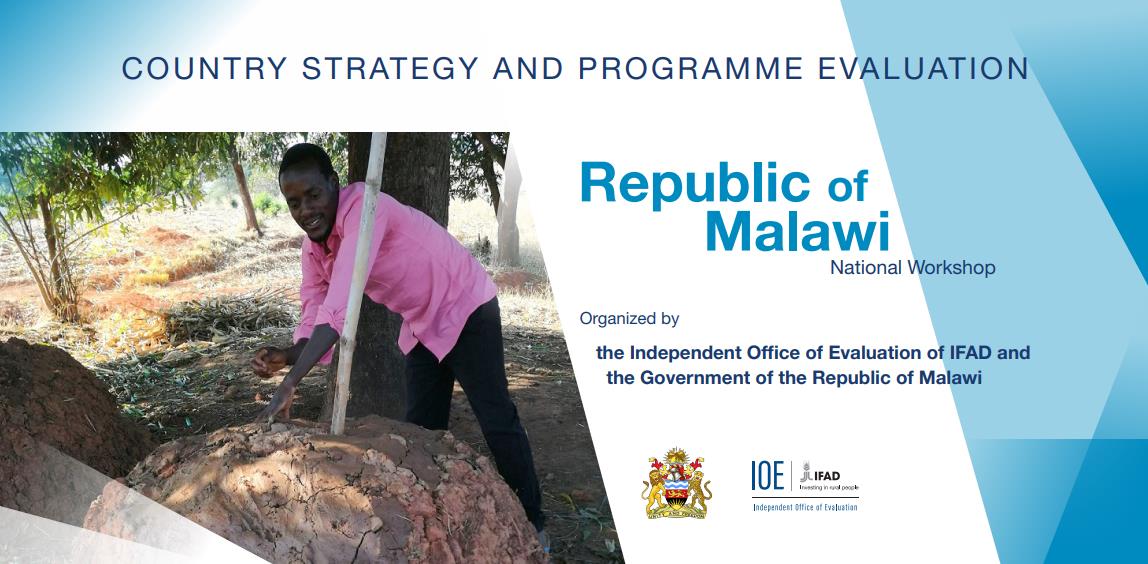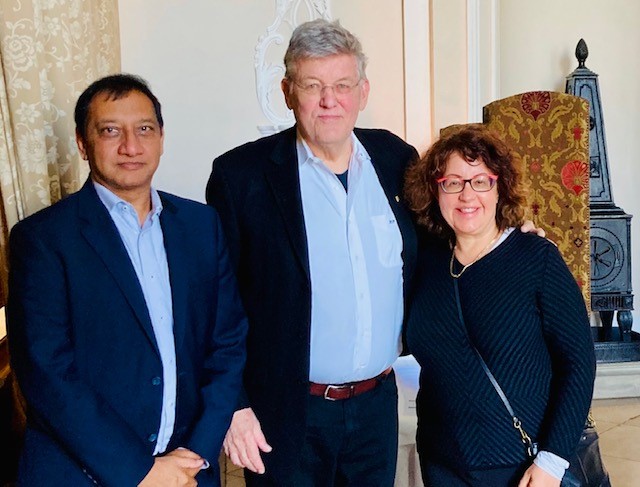IFAD to include environmental restorative solutions in climate change adaptation responses - IOE
Rome, 19 May 2022 – Climate change adaptation (CCA) interventions must do no harm to the environment. However, across the world, this not always the case, observes the soon-to-be-published report by the Independent Office of Evaluation of IFAD (IOE), titled ‘Thematic Evaluation of IFAD’s Support for Smallholder Farmers’ Adaptation to Climate Change’. High-level representatives from the IFAD Executive Board (EB) joined the Fund’s senior management to address this and other related issues head-on, during a public virtual learning event on 19 May 2022.
“The Thematic Evaluation found that there is a need to develop climate adaptation solutions that simultaneously promote not only climate resilience, but also environmental and economic resilience. Where that is not feasible, we should aim to ‘do-no-harm’ or better, with the necessary offsets to compensate for the damage that is being done to the ecosystems”, explained Suppiramaniam Nanthikesan, Lead Evaluation Officer at IOE, and lead author of the CCA Thematic Evaluation.
IOE’s Thematic Evaluation (TE) found that IFAD is already implementing CCA projects that do no net harm to the environment. These successful interventions are landscape-scale, integrated interventions providing natural solutions to underlying climate threats, and they involve strong engagement with beneficiaries and stakeholders during design and implementation. These offer important lessons to help IFAD expand its CCA guidance to include restorative solutions in order to fulfil its commitment to go beyond doing no harm and restore the environment.
“Climate change is here to stay, that is why it’s such an important topic. IFAD was an early mover on CCA small-scale agriculture through the adaptation for smallholder agriculture programme that has had some really good results, which is why we want to scale it up and deepen in. However, although we’ve always had ambitions in the areas of climate adaptation, it’s fair to say that IFAD’s capabilities still need to grow in a number of areas, as the report brings out, presenting us with specific recommendations in this regard”, stated Donal Brown, IFAD Associate Vice-President, Programme Management Department.
Hosted by IOE, the on-line virtual workshop was a fully public event that brought together a wealth of high-level attendants. Over 80 participants joined the event, including representatives of the EB and government counterparts, in addition to members of civil society organizations, development partners, academia, private sector, IFAD senior management and staff, and the general public.
The event aimed to promote broad ownership and use of the evaluation report, and to provide a full understanding of findings, key messages and recommendations. It involved a brief presentation of the evaluation followed by a question and answer session. The second part of the event featured a discussion panel around the following three themes: conceptualizing climate resilience in projects; ensuring environmental sustainability of climate solutions; and promoting scaling-up and knowledge management related to climate change adaptation response. The panel members comprised of IFAD managers, as well as technical specialists involved with successful climate projects.
Discussants recognized that IFAD’s experience in working with marginalized communities in the rural agricultural sector, often facing adverse climatic and environmental conditions, has positioned it well to address the accelerating risks from climate change and to place CCA as a strategic institutional priority. As it learns from experience, IFAD’s approach to CCA is evolving and progressing in the right direction. Over the past decade, IFAD has developed and updated its climate strategy and continues to improve the institutional environment for CCA responses. Furthermore, IFAD has assessed climate risks in all its country strategies and operations and integrated climate response in every all intervention.
“IFAD has really established itself as a major player in climate adaptation. We are committed to ensuring that 40% of our core resources are dedicated to climate finance, with more than 90% of this going to adaptation. This is really a break-away from most of the other agencies that work in climate, because they spend a much larger proportion on mitigation. The key areas that we are focusing on are innovation, scaling-up and measurement”, affirmed Jyotsna Puri, IFAD Associate Vice-President, Strategy and Knowledge Department.
To better understand its results, IFAD’s climate efforts need a clear conceptual framework to assess actual improvements to climate resilience of smallholders and corporate guidance to strengthen smallholders’ climate resilience together with environmental and socio-economic resilience. In addition, IFAD’s analysis highlights significant gaps in technical capacity at headquarters and project level to mainstream and monitor CCA responses.
Against this backdrop, workshop participants recalled the recommendations of the CCA TE. These include the need to update the IFAD Strategy and Action Plan on Environment and Climate Change 2019–2025, to comprehensively address bottlenecks to CCA performance; the importance of systematically prioritizing scaling-up and other non-lending activities with dedicated resources, to successfully strengthen smallholder climate resilience; and the need to ensure sustained organizational learning from operational experience to improve current and future CCA performance.
“In addition to the conclusions and recommendations, the report provides a wealth of evidence across a range of issues. This includes an overview of the historic evolution of climate responses in IFAD, a comparison of related policies and approaches in select IFIs and UN agencies, an analysis lessons from all available scientific literature on what works, to name a few. In addition, drawing from the experiences in 20 countries, the annexes provide rich information on the elements that make climate responses more relevant, effective and efficient”, noted Indran A. Naidoo, Director of IOE.
IFAD formally recognized CCA as a corporate priority in the eighth replenishment of its resources (IFAD8) (2010–2012). Since then it has mobilized over US$500 million to finance CCA interventions. Under the forthcoming IFAD12 (2022–2024), IFAD has committed to ensuring that 40 per cent of its programme of loans and grants is climate-focused.
The impetus for this evaluation came in 2019, when the EB approved it as part of the work plan of the Independent Office Evaluation of IFAD (IOE). The evaluation assessed the extent to which IFAD efforts have promoted climate resilient livelihoods for smallholders and improved their food security and covered the period since CCA was declared as a corporate priority in 2010. The scope of the evaluation was comprehensive and included all related IFAD operations and country strategies in all in all client countries as well as IFAD’s business model related to CCA.
To access the video recording of the event, please click here
For further information, please contact Alexander Voccia here


